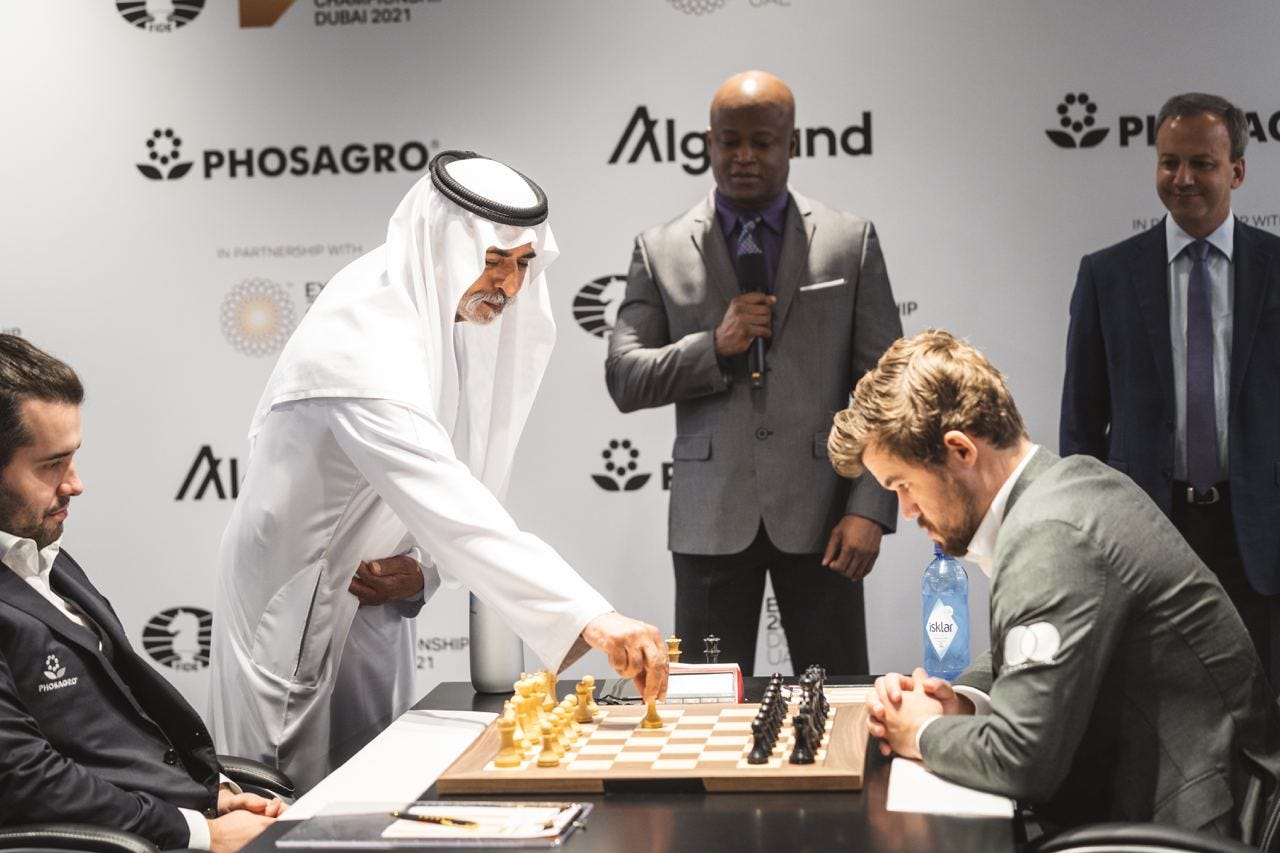Tolerance and Coexistence in the World Chess Championship
Are we missing the real debate in the World Chess Championship?
Maurice Ashley stands poker-still in front of the playing surface at the World Chess Championship and reads off the autocue. He announces both of the players, completes all the formalities, and then introduces the luminary who will make the first move of the game.
The first move is a tradition of the World Championship in which some celebrity or political authority gets the game going by moving one of the pieces. I have no idea when it was first introduced but in the age of branding, it has become even more ubiquitous. If you can get money or earn prestige by getting someone by that board, then you do it.
Ahead of Game 5, Ashley—the Master of Ceremonies—introduces a man who strides in wearing a starched white kandora and matching ghutrah. This is Sheikh Nahyan bin Mubarak Al Nahyan, the United Arab Emirates’ Minister of Tolerance and Coexistence. He leans over the board and pushes the c-pawn (later retracted by Nepomniachtchi, who plays e4) before shuffling off stage right.
He was there and then he was gone. But what was the function of this public gesture? Sportswashing is a curious thing. A slippery concept, it references the way soft power can be used to subtly manipulate the general perception of a state and bring them onto the global stage. Have the Minister of Tolerance and Coexistence announced by Maurice Ashley at the beginning of a World Chess Championship game and you indirectly reference the fact that the United Arab Emirates has a Ministry of Tolerance. That sounds like a liberal-progressive country, right?
What you won’t hear about Sheikh Nahyan bin Mubarak Al Nahyan is that, in April 2021, a British woman named Caitlin McNamara claimed that she was sexually assaulted by him at a private residence in Abu Dhabi on 14 February 2020. In the end, the Crown Prosecution Service said it could not bring charges because the alleged offence happened abroad. Tolerance? Yes. But perhaps not the kind of tolerance we are looking for.
And this is just one instance within a much broader macrocosm of soft power play. This is not just about papering over individual misdemeanours. It is about furthering the cause of various polities around the world. We see it in football. Russian oligarchs can buy clubs to increase their profile within the West. Public Investment Funds can buy clubs to interpolate themselves into the orbit of foreign government. The British government themselves can use football as a means of orientating themselves within the perception of their civilians.
What does this mean for the World Chess Championship? The irony of chess being used as a pawn in a global game should not be lost. When it comes to FIDE, though, there should be little surprise that pecuniary considerations trump (no pun) ethical ones. We’ve already been lectured about why the Motiva sponsorship is non-negotiable as a deal. Why should we be surprised that they seem happy to give tournaments to authoritarian states at a rate of knots?
On the board in Game 5, there is another version of tolerance and coexistence being played out. Nepomniachtchi with white. Another Ruy Lopez. Another sharp position. At times in the game, Carlsen looks… not *in* trouble but in the foothills of being in trouble. Some pundits suggest that, as soon as Neponiachtchi is out of book, he simplifies down. Of course, the reigning champion defended perfectly against 20. Rook ed1. But we will never know what would have happened if the move c4 had been played instead.
Once again, deliberations unfold about the entertainment value of draw after draw after the game. Is endless parity bad for the marketability of chess? I have no idea how you go about answering that question to be honest. But I am sure of one thing: there should be a bigger debate about FIDE’s propensity to sell chess’s soul to the highest bidder. Surely this will have a bigger impact on the future of chess than a few draws in a World Chess Championship?

